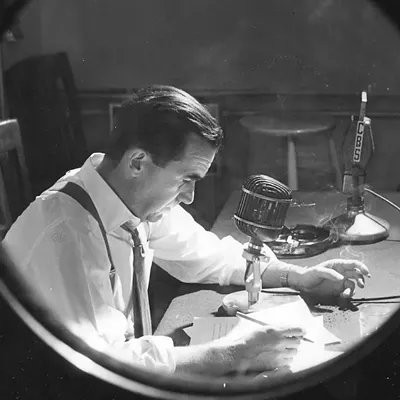According to ordinance language, anyone who is under the influence of alcohol or drugs, harassing another person or disturbing the peace could be barred from county property. And if banned, offenders caught on county grounds could be charged with a misdemeanor, punishable by up to a year in prison and a $1,000 fine.
"This is only intended for the most egregious violations," says Pat Braden, the county civil attorney who wrote the amendment. He says there will be an appeal process for anybody who is banned. "This is based on conduct. We're not going to go excluding people on a whim."
Typically, first-time offenders would not receive a yearlong ban, Snyder says. Violators would be given warnings and the harshest suspensions would be reserved only for ongoing situations.
But the law's language is fuzzy. Nothing in the ordinance itself promises that people will actually receive warnings or that the use of the bans would be limited to repeat offenders. That could problematic if it's ever challenged in court, says Jay Ames, a Spokane County public defender.
"Laws with vague language are darn ripe for abuse," says Ames, a supervisor of Spokane County's misdemeanor department. Ames says he hasn't had time to fully examine the ordinance, but sees potential problems with it. For one, he says, there should be specific steps for escalating punishments, i.e., one violation resulting a fine, two in a 90-day ban and so forth.
Also, because banned people aren't arrested, they don't have the same protections that they would have if charged with a crime. "Without making it a crime, your constitutional rights don't kick in," Ames says.
Snyder, though, says he has the utmost faith in his staff and sheriff's deputies to use their own discretion when dealing out punishments. County officials would never use the power to ban a person for any reason other than an extreme violation of park conduct, he says.
In 1997, a similar law was passed in Seattle, giving authorities the power to ban troublemakers from city parks. Critics of the law argued that it unfairly targeted poor and homeless people.
Ames sees the same potential problem in the Kootenai County ordinance. "Targeting people who 'harass' sounds like targeting panhandlers or homeless people," he says. He also says the ordinance doesn't clearly define what harassment is, which could allow county authorities to ban people too easily.
Snyder says an appeal process will counter any sense of injustice, however. He says long-term bans will be extremely rare anyway and that most bans would only be long enough for a drunken person to get sober.
"Having the ability to ban somebody for 24 hours is essential," Snyder says. "The [violator] is probably a good person, they've just had too much to drink and need to go home and sleep it off."
Snyder says the goal is to protect children and families who use the parks in peaceful and law-abiding ways. He says the decision to go ahead with the amendment was a culmination of different cases of people being too wild. There was a neighbor at one park who "wasn't particularly friendly" to people at a boat launch on a consistent basis, Snyder says, and this specific case underscored the need for the amendment.
The American Civil Liberties Union has previously raised concerns about ordinances that ban people from public areas. Larry Frankel, a member of the legislative counsel at the ACLU in Washington D.C., says courts don't look too kindly on these types of ordinances, which often give too much discretion to law enforcement officers.
In the past, the Supreme Court has thrown out loitering laws because the language was too vague or broad. In 1972, in Papachristou v. Jacksonville, the court overturned a Florida law because it gave too much arbitrary power to police.
Ames says ordinances like the one in Kootenai County have a good chance of being overturned if they are challenged in court. Snyder, however, says banning people from parks is nothing new.
"The overall spirit of the ordinance," he says, "is very common in other park rules." n
totheeditor@inlander.com














